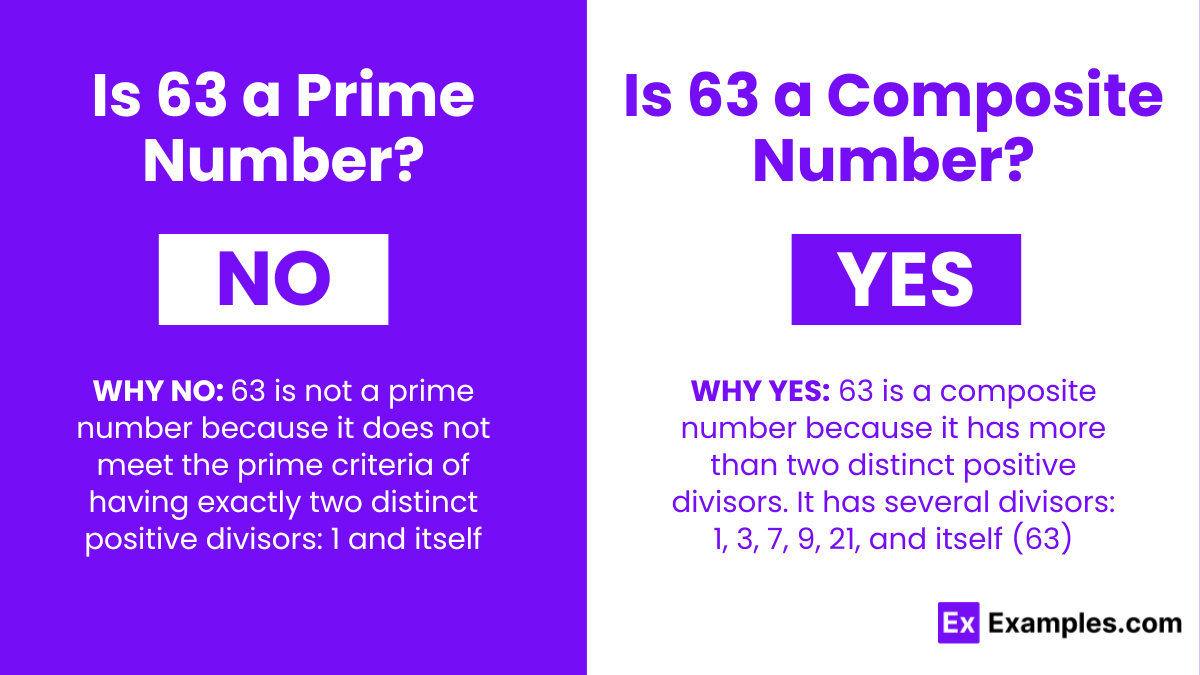Is 63 a prime number or a composite number?
Prime Number
Composite Number
Neither Prime nor Composite
Both Prime and Composite


Why No: 63 is not a prime number because it does not meet the prime criteria of having exactly two distinct positive divisors: 1 and itself. Instead, 63 has divisors 1, 3, 7, 9, 21, and 63. Use this Prime number Checker to check for any number.
Why Yes: 63 is a composite number because it has more than two distinct positive divisors. It has several divisors: 1, 3, 7, 9, 21, and itself (63).
| Property | Answer |
|---|---|
| Is 63 a prime number? | No |
| Is 63 a composite number? | Yes |
| Is 63 a perfect square? | No |
| Factors of 63 | 1, 3, 7, 9, 21, 63 |
| Multiples of 63 | 63, 126, 189, 252, 315, 378, 441, 504, 567, 630 |
| Cube Root of 63 | Not a whole number |
| Square of 63 | 3969 |
| Square Root of 63 | 7.937 |
| Is 63 a Perfect Cube? | No |
| Is 63 an Irrational number | No |
| Is 63 a Rational number | Yes |
| Is 63 a Real number | Yes |
| Is 63 an Integer | Yes |
| Is 63 a Natural number | Yes |
| Is 63 a Whole number | Yes |
| Is 63 an Even or odd number | No (63 is an odd number) |
| Is 63 an Ordinal number | Yes |
| Is 63 a Complex number | Yes (as all real numbers are also complex numbers) |
The factors of 63 are 1, 3, 7, 9, 21, and 63. These are the numbers that divide 63 evenly without leaving a remainder, showcasing its composite nature.
63 is recognized not as a prime number but as a composite number because it has divisors other than 1 and itself, specifically 1, 3, 7, 9, 21, and 63. This distinguishes it from prime numbers, which have exactly two distinct positive divisors. While the number 63 may not be as frequently associated with harmony or spiritual significance in various cultures as some numbers, it serves as a reminder of the diversity and utility of numbers in mathematics. Its status as a composite and odd number underscores the variety of numerical properties and their applications in different fields, highlighting the integral role of mathematics in understanding the world around us.
The nearest prime numbers to 63 are 61 (before) and 67 (after). These primes are the closest to 63, highlighting its position between two prime values in the number line.
Whether 63 is coprime depends on its pairing. Two numbers are coprime if their greatest common divisor (GCD) is 1, meaning they share no prime factors.
63 is not a prime number, so it does not have “a prime factor” in the sense that a prime number is its own prime factor. However, the prime factors of 63 are 3 and 7.
No, 63 is not a perfect square. A perfect square is a number that can be expressed as the square of an integer, and there is no integer whose square equals 63.
Text prompt
Add Tone
10 Examples of Public speaking
20 Examples of Gas lighting
Is 63 a prime number or a composite number?
Prime Number
Composite Number
Neither Prime nor Composite
Both Prime and Composite
How many positive divisors does 63 have?
1
2
4
6
Which pair of numbers multiplied together equals 63?
6 and 9
7 and 9
8 and 8
5 and 13
What is the prime factorization of 63?
2×31
3×21
32×7
5×13
Which statement is true about 63?
It is only divisible by 1 and itself.
It is divisible by 1, 3, and 7.
It is a prime number.
It is less than 60.
If you divide 63 by 9, what is the result?
7
8
6
5
What is the smallest prime number that divides 63?
5
7
3
11
Which of the following is a factor pair of 63?
5 and 11
2 and 31
3 and 21
4 and 16
When checking if 63 is a composite number, which of the following calculations can you use?
63 ÷ 2
63 ÷ 3
63 ÷ 5
63 ÷ 8
Which of the following methods can confirm that 63 is a composite number?
Checking if it is divisible by 4
Checking if it is divisible by 1 and itself
Finding any divisors other than 1 and 63
Proving it is an even number
Before you leave, take our quick quiz to enhance your learning!

